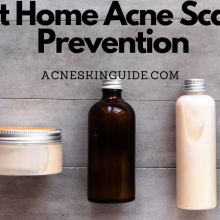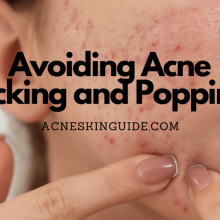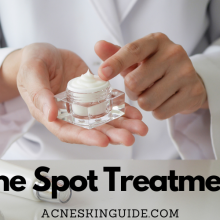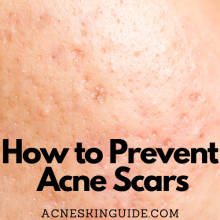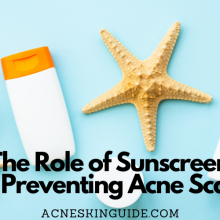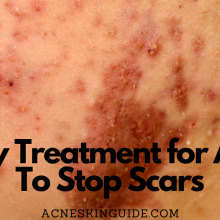Acne Treatments for Scar Prevention | Acne Skin Guide
Acne is a prevalent skin condition affecting millions, and its impact goes beyond physical appearance as it can lead to permanent scarring and emotional distress. Proper, early treatment is crucial for preventing acne scars. While over-the-counter products can help with mild cases, dermatologists offer more potent prescription medications and procedures for severe acne. Consistency throughout the treatment course is vital.
Potential side effects of certain acne treatments should be weighed against the benefits. Complementary approaches like dietary changes and gentle skincare can provide additional support. For existing scars, professional treatments like lasers offer the best results, though complete scar removal is difficult. Psychological support is equally important when coping with acne scars. Ultimately, a comprehensive plan involving prompt medical intervention, lifestyle adjustments, and self-care paves the way for clearer, healthier skin while boosting confidence.
#1 Recommended Acne Treatment | #2 Recommended Acne Treatment |
 |  |

The Battle Against Acne Scars: Why Proper Treatment is Crucial
Acne is more than just a teenage nuisance – it’s a condition that affects millions of Americans of all ages. According to the American Academy of Dermatology, acne is the most common skin condition in the United States, impacting up to 50 million people annually. While not life-threatening, the effects of acne can be emotionally devastating, especially when it leads to permanent scarring.
The Lasting Impact of Acne Scars
Acne scars are caused by inflammation that damages the skin’s inner layers during acne breakouts. As the acne clears, the body attempts to repair this damage, resulting in scar formation. These scars come in various forms – ice pick scars, boxcar scars, rolling scars, and hypertrophic or keloid scars. Not only are they cosmetically unappealing, but acne scars can also lead to a significant loss of self-confidence and emotional distress.
A 2019 study published in the Journal of Cosmetic Dermatology found that individuals with acne scars had significantly lower self-esteem scores compared to those without scars. The psychological impact of acne scarring is often overlooked, but it can be just as debilitating as the physical effects.
Preventing Scars: The Importance of Early Intervention
While treating existing acne scars can be challenging, the key to preventing permanent scarring lies in prompt and proper acne treatment from the onset. The earlier acne is addressed, the better the chances of avoiding long-lasting scars.
Over-the-counter treatments containing ingredients like benzoyl peroxide, salicylic acid, and retinoids can be effective for mild to moderate acne. However, for more severe cases or stubborn acne, seeking professional help from a dermatologist is crucial.
Dermatologists have a range of prescription options at their disposal, including oral antibiotics, stronger retinoids (like tretinoin or adapalene), and hormone therapy for hormonal acne. In-office procedures like chemical peels, laser treatments, and cortisone injections can also help reduce inflammation and prevent scarring.
Consistency is Key
Regardless of the treatment method, consistency is paramount in acne management. Stopping or skipping medications midway through the treatment course can lead to a resurgence of acne and increase the risk of scarring. It’s essential to follow your dermatologist’s instructions carefully and complete the entire treatment regimen for maximum efficacy.
Potential Downsides of Acne Treatments
While acne treatments are generally safe and effective, there are potential downsides to be aware of:
- Dryness, redness, and irritation are common side effects of many topical acne medications, especially those containing retinoids or benzoyl peroxide.
- Oral antibiotics can lead to antibiotic resistance, gastrointestinal issues, and other side effects with long-term use.
- Isotretinoin (formerly known as Accutane), a powerful oral retinoid, has been linked to severe side effects like depression, inflammatory bowel disease, and birth defects if taken during pregnancy.
- Procedures like chemical peels and laser treatments can cause temporary redness, swelling, and skin sensitivity.
It’s essential to discuss the potential risks and side effects with your dermatologist and weigh the benefits against the potential downsides.
Complementary Approaches and Lifestyle Changes
In addition to medical treatments, incorporating complementary approaches and making lifestyle changes can support your acne management efforts. Natural remedies like tea tree oil, aloe vera, honey, and apple cider vinegar have shown some promise in treating acne, but they should be used cautiously and in conjunction with proven medical treatments.
Maintaining a gentle, non-irritating skincare routine, avoiding picking or squeezing pimples, using non-comedogenic (non-pore-clogging) products, and wearing sunscreen daily can also help prevent further inflammation and scarring.
Treating Existing Acne Scars
If acne scars have already formed, there are various treatment options available, albeit with varying degrees of success and potential downsides:
- Over-the-counter scar gels containing ingredients like silicone or onion extract can help improve the appearance of scars, but results are often modest.
- Professional treatments like laser resurfacing, microneedling, and fillers can be more effective but are also more expensive and may require multiple sessions.
- Surgical revision, such as punch excisions or subcision, may be recommended for severe scarring but carries risks of further scarring and complications.
It’s crucial to have realistic expectations when treating existing acne scars, as complete scar removal is often challenging, and results can vary depending on the individual’s skin type and scar severity.
Coping with Acne Scars
While seeking treatment for acne scars is important, it’s equally vital to address the emotional impact of scarring. Building self-confidence through counseling or support groups, learning makeup techniques to camouflage scars, and surrounding yourself with a positive support system can all help in coping with acne scars.
Remember, acne scars do not define your worth or diminish your value as a person. With time, patience, and the right mindset, it is possible to embrace your skin and feel confident in your own skin.
The Road Ahead
Preventing acne scars requires a comprehensive approach that combines prompt medical treatment, consistent care, and a commitment to a healthy lifestyle. While the journey may not be easy, persevering with a dermatologist’s guidance and a tailored acne management plan can significantly reduce the risk of permanent scarring.
By taking control of your acne today, you are paving the way for healthier, smoother skin and a renewed sense of confidence. Remember, your skin’s health is not just a cosmetic concern but a reflection of your overall well-being. Embrace the importance of proper acne treatment, and you’ll be one step closer to a life free from the burden of acne scars.
#1 Recommended Acne Treatment | #2 Recommended Acne Treatment |
 |  |
Summary and FAQs
Is there a difference in scar prevention between different types of acne (blackheads, whiteheads, cystic acne, etc.)?
Yes, there is a difference in scar prevention between different types of acne lesions. Generally, the more severe and inflammatory the acne, the higher the risk of scarring.
Blackheads (open comedones) and whiteheads (closed comedones) are non-inflammatory forms of acne that are less likely to cause scarring unless they become severely inflamed or are picked at excessively.
Inflammatory acne lesions like papules, pustules, and nodules carry a higher risk of scarring. These raised bumps penetrate deeper into the skin and can rupture, leading to more extensive damage and scarring.
Cystic acne, which involves large, painful lesions filled with pus, poses the greatest risk for permanent scarring. The intense inflammation and depth of these lesions can destroy skin tissue and collagen, resulting in depressed or raised scars.
Prompt and proper treatment is crucial for all types of acne to minimize inflammation and prevent acne lesions from worsening and causing scars. However, more aggressive treatment is generally required for inflammatory acne, especially cystic acne, to reduce the likelihood of scarring.
Can certain foods or dietary changes help prevent acne scarring?
Yes, certain dietary changes may potentially help prevent acne scarring, although more research is still needed in this area. Here are some ways that diet may play a role:
- Low-glycemic diet: Foods with a high glycemic index can spike blood sugar and insulin levels, which may increase inflammation and acne severity. Following a low-glycemic diet rich in whole grains, vegetables, and lean proteins may help reduce inflammatory acne lesions that are prone to scarring.
- Dairy restriction: Some studies suggest that the hormones in milk products may worsen acne for some people. Eliminating or reducing dairy intake could decrease acne flare-ups and subsequent scarring.
- Increased omega-3s: Omega-3 fatty acids from fish oil, walnuts, flaxseeds, etc. have anti-inflammatory properties that may help calm acne-related inflammation and prevent the rupturing of lesions that leads to scars.
- High antioxidant foods: Antioxidant-rich foods like berries, leafy greens, nuts, and seeds may counter oxidative stress, which is believed to be involved in acne development and scarring.
- Probiotic-rich foods: The gut microbiome is linked to skin health. Foods with probiotics, like yogurt, kefir, and sauerkraut, may promote better gut health and reduce acne inflammation.
While dietary changes alone may not completely prevent scarring, combining them with proper medical acne treatment can provide an additional anti-inflammatory boost to reduce the risk of permanent acne scars. However, it’s important to note that individual responses to dietary changes can vary, and consulting a dermatologist or a registered dietitian can help determine the best approach.
How soon after starting proper acne treatment can you expect to see results in terms of reduced scarring?
When it comes to seeing results in reduced acne scarring after starting proper treatment, it’s important to have realistic expectations and understand that it can take several weeks or even months to see noticeable improvements. Here’s a general timeline of what you can expect:
1-4 weeks:
In the first few weeks of starting acne treatment, you may not see much change in existing scars. However, the treatments will start working to bring active acne lesions under control, which is the first step in preventing new scars from forming.
4-8 weeks:
As your acne starts to clear up, you may notice that new acne lesions are less inflamed and less likely to rupture and cause scarring. Existing scars may appear slightly smoother or less raised during this time.
2-3 months:
After 2-3 months of consistent treatment, you should see a significant reduction in new acne lesions and inflammation. This reduced inflammation can help prevent further scarring from occurring. Existing scars may start to gradually fade and become less noticeable.
4-6 months:
For most people, it takes around 4-6 months of dedicated acne treatment to see significant improvements in the appearance of existing acne scars. The scars may continue to flatten, fade in color, and become less indented or raised.
6 months and beyond:
Continuous acne treatment and proper skincare can lead to further improvements in scar appearance over time. However, it’s important to note that complete scar removal is often challenging, and some scarring may persist even with excellent treatment.
Keep in mind that individual results can vary based on factors like the severity of scarring, skin type, and the specific treatments used. Patience and consistency are key when it comes to seeing optimal results in acne scar reduction.
Are there any specific supplements or vitamins that can aid in acne scar prevention when used alongside medical treatment?
Yes, there are several supplements and vitamins that may help aid in acne scar prevention when used alongside medical acne treatment. Here are some of the most promising ones:
- Zinc: This mineral has anti-inflammatory properties and plays a role in wound healing. Some studies suggest that zinc supplements can help reduce acne severity and may aid in preventing scarring.
- Vitamin C: As a powerful antioxidant, vitamin C can help neutralize free radicals that contribute to inflammation and tissue damage. It also supports collagen production, which is important for healthy skin healing.
- Vitamin E: Like vitamin C, vitamin E is an antioxidant that can help reduce inflammation and promote wound healing. It may help prevent acne scars by protecting skin cells from oxidative stress.
- Omega-3 fatty acids: Found in fish oil supplements, omega-3s have anti-inflammatory effects that can help calm acne breakouts and reduce the risk of scarring.
- Probiotics: Emerging research suggests that probiotics may help improve acne by regulating inflammation and supporting a healthy gut-skin axis.
- Collagen supplements: While more research is needed, some studies indicate that collagen supplements may aid in wound healing and potentially reduce the appearance of acne scars over time.
It’s important to note that supplements should never replace medical acne treatments prescribed by a dermatologist. Instead, they can be used as a complementary approach to potentially enhance the effects of acne medications and support overall skin health.
Always consult with a healthcare professional before starting any new supplement regimen, as some may interact with medications or have potential side effects, especially when taken in high doses.
Is there a higher risk of scarring for certain age groups or skin types when it comes to acne?
Yes, there can be a higher risk of acne scarring for certain age groups and skin types:
Age Groups:
- Teenagers and young adults: This age group is more prone to scarring from acne due to fluctuating hormone levels that can cause more severe, inflammatory acne breakouts.
- Older adults: As skin loses elasticity and collagen with age, it may be more susceptible to developing scars from acne lesions.
Skin Types:
- Darker skin tones: People with higher melanin levels in their skin are more likely to develop raised keloid or hypertrophic scars after acne clears.
- Oily skin: Those with oily, acne-prone skin may experience more severe breakouts that increase scarring risk if not properly treated.
- Sensitive skin: Individuals with sensitive skin may have exaggerated inflammatory responses to acne, raising scar potential.
Other Risk Factors:
- Genetics: Some people may simply have a genetic predisposition to develop scars more readily after any injury or inflammation to the skin.
- Delays in treatment: Leaving acne untreated for long periods heightens scarring risk as inflammation persists unchecked.
- Picking/squeezing acne: This can worsen lesions and lead to more skin damage and scarring.
While no one is completely immune to acne scarring, being aware of the higher risk for certain groups emphasizes the importance of early, aggressive treatment tailored to one’s age, ethnicity, and skin type to prevent permanent scars from forming.

